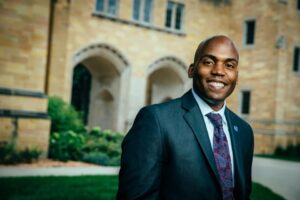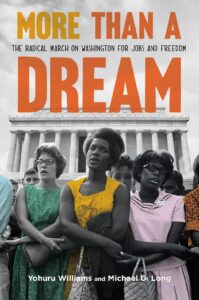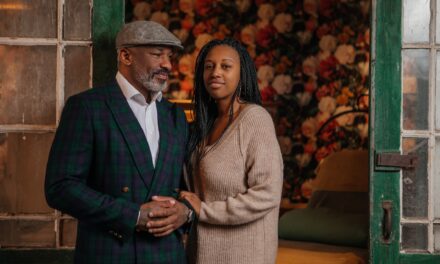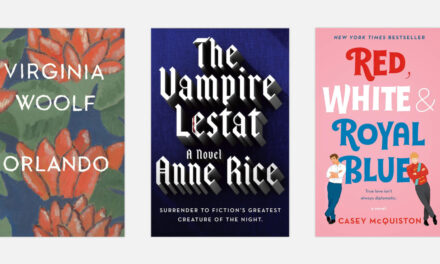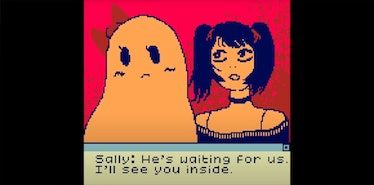You might have noticed yesterday that the longlist of nominees for the National Book Awards for Young People’s Literature was released to the public. I’ll be honest with you. Normally when that list is released it’s just a slew of YA titles with two middle grade fiction books for spice. I can’t remember the last time I was actually impressed with the choices. This year’s list, however, is amazing. I’d read title after title, which is almost never the case, and I disagreed with none of the choices.
I was also particularly pleased to see that the book we’re honoring here today, More Than a Dream: The Radical March on Washington for Jobs and Freedom by Yohuru Williams and Michael C. Long, was included as well. You’d think I timed today’s interview with the creators of the book on purpose, but I swear to you that this is just an amazing coincidence.
SCROLL TO KEEP READING THIS POST
ADVERTISEMENT
ADVERTISEMENT
Here’s a quick rundown of the book itself:
“Just in time for the 60th anniversary on August 28, the scholars behind Call Him Jack deliver another eye-opening nonfiction read this time focusing on the groundbreaking 1963 March on Washington for Jobs and Freedom, shifting the focus to the protest’s radical roots and the underappreciated role of Black women.
Called “an essential reeducation” by Ibram X. Kendi, More Than a Dream looks at the march through a wider lens, using Black newspaper reports as a primary resource, recognizing the overlooked work of socialist organizers and Black women protesters, and repositioning this momentous day as radical in its roots, methods, demands, and results.”
And I can think of no better way to celebrate a 60th anniversary than with a National Book Award nomination.
Betsy Bird: Michael and Yohuru, thank you so much for joining us here today! At the risk of sounding like I’m speaking in superlatives, I don’t think it’s a stretch to say that informational books for young people today contain a level of nuance and understanding of historical complexities never before seen (and, to be frank, seen too little in some works for adults). Your book MORE THAN A DREAM takes The March on Washington and Dr. King’s work and pulls back to show kids that this work wasn’t just because of one guy at one time. What are the roots of this book? Where did it come from?
Michael G. Long: It sprouted organically from our earlier work on Jackie Robinson (Call Him Jack), where we sought to show young readers that Robinson was more than the baseball player who broke the color barrier. After we finished that book, Yohuru and I continued chatting about civil rights projects, and he noted, brilliantly, I might add, that the March, like Robinson, is typically depicted in very narrow terms, and that it would be exciting for us to help young readers understand that the March was far more than Dr. King’s dream, that it was a demand for economic justice and desegregation. As soon as he mentioned that, I was marching right beside him.
Yohuru Williams: I would add that we were also deeply inspired by our contemporary moment. It is difficult to escape the parallels between 1963 and 2023, and we hope the book will help young readers make those connections. The March was conceived, in part, to commemorate the 100th anniversary of the Emancipation Proclamation and how much work remained to be done in achieving absolute equality for Black people. Sixty years on, unfortunately, that work continues.
BB: Well, let’s talk logistics then. When co-writing a book with one another, how do you parcel out the work? Do you have individual specialities that you fall back on? Does each person take on a specific chapter? What’s your process?
Mike: Yohuru and I aren’t just collaborators. We’re also friends who know each other’s interests and specialties really well.
Yohuru: Mike and I both love to research. One of our biggest challenges as collaborators, however, is my penchant for going down rabbit holes. I really enjoy the process of discovery, while Mike is very focused and organized. And that certainly helps keep us on track. The great thing about working with a co-author is that you can share ideas and research as the project is developing and that makes the whole process that much more rewarding.
Mike: So the division of labor was rather obvious for certain sections of the book. For example, because Yohuru has an expertise in Black militancy, it was clear that he would draft the chapter on John Lewis’s militant speech. And because I have a special interest in Bayard Rustin, we agreed that I would draft the chapter on choosing the main organizer of the March. After drafting our assigned chapters, we tossed them back and forth until we both agreed on style and content. It was a Big Bang of a process, and I’m so glad to report that we’re still friends.
BB: Good thing too! Now I am perpetually interested in nonfiction works for older kids and teens that do their own original research. With your specific focus on the role of Black women and socialist organizers, I want to know more about how you researched this. MORE THAN A DREAM, from what I can tell, isn’t one of those books that just produce a young reader’s version from an adult text. So how did you both decide to format the book and then, once you did, what was your research process like?
Mike: We wanted the book to be new, fresh, and groundbreaking. With this in mind, we decided to organize it in a way that would give sustained attention to the long-ignored theme of socialism and to the hidden voices of Black women and student activists.
Yohuru: Yes, it was very important for us to center Black voices, and those of marginalized persons like Pauli Murray and Bayard Rustin.
Mike: Then we researched these topics as if we were a Boston terrier digging up an old bone in the backyard. Our first stop was always a database with historical Black newspapers. They covered the roots, methods, and goals of the March in detail that we couldn’t find elsewhere. Plus, the Black newspapers really helped me, as a white researcher, grasp the uniquely Black perspectives of the March. Also, our goal was to use primary rather than secondary sources, not merely because young readers deserve original research, but because we wanted to give our readers a model for using accessible primary sources.
Yohuru: That is why we included so many primary resources in the book. We really wanted to expose young readers to the process of historical research.
BB: Beautiful. Did anything unexpected surprise either of you in the course of this research?
Mike: We were surprised at the concerted effort to tamp down the presence of young people at the march. The guidelines stated that people under 14 years old should not attend and that those over 14 should be accompanied by an adult or guardian. The organizers were reportedly concerned for the safety of young folks. But they also feared that young militants might provoke disorder at the March. This was surprising to us because we knew that Dr. King and other civil rights leaders strongly encouraged young people in Birmingham to protest on the streets and parks, even though they well understood that Birmingham’s leaders would not hesitate to use violence against the young activists. The students of Birmingham, as well as elsewhere in the civil rights movement, inspired thousands of people to attend the March, and it’s disappointing the organizers denied them the starring role they deserved.
Yohuru: It was great to be able to document this and present it as part of the story so that young readers in particular could appreciate the role that young people have played in history.
BB: And are there specific assumptions that kids and teens might have that you’re hoping this book might upend?
Mike: Young readers familiar with videos of the March may have the idea that it was like a big picnic, with lots of fun, laughter, and back-slapping. No doubt, the March was a joyful event on many levels. But our book seeks to upend the belief that the March was only that.
Yohuru: We show young readers that the March was also somber and serious, angry and militant, impatient and demanding, about life-and-death issues like police brutality, violence against Black people, unemployment, and poverty.
BB: I have to ask. Was there anything specific that you wish you could have included in the book but that had to be cut for one reason or another?
Mike: Oh, my gosh, yes. The back of our book includes about forty fascinating facts that we don’t mention in the overall story of the March.
Yohuru: Yes, that was frustrating because there were so many interesting tidbits and stories that we uncovered that I wish we could have included.
SCROLL TO KEEP READING THIS POST
ADVERTISEMENT
ADVERTISEMENT
Mike: To be more specific, I wish we could have included more information about FBI director J. Edgar Hoover’s vicious, conniving, and wrongheaded efforts to undermine Bayard Rustin and the March. Maybe someday we’ll discover more FBI files that will fully reveal Hoover’s anti-American treatment of the March. They would probably be worth an entirely new book.
Yohuru: For me, it was the stories of local activists and their respective journeys to DC for the March. I became enamored with a group of demonstrators from my home city of Bridgeport, Connecticut, and really wanted to talk more about them, not only because they were from my hometown, but because it shows how far reaching the appeal of the March was and how it brought so many people together to fight for racial justice.
BB: Just to wrap this up, are you two working on another book and, if so, can you tell us anything about it?
Mike: Yes! We love working together, and we relish finding important parts of US history that deserve far better treatment than they’ve received. I don’t know if we’re allowed to talk about our next project, but suffice it to say that our young readers can expect that we will dig through primary resources, uncover old facts, and present new ways to celebrate and criticize our shared, wonderful, and troubling history.
I simply cannot thank Yohuru and Mike enough for the sheer amount of time they put into answering my questions here today. Thanks too to Morgan Rath at Macmillan Children’s Publishing Group for having the insight to suggest this. More Than a Dream: The Radical March on Washington for Jobs and Freedom is available in bookstores and on library shelves now. Be sure to check it out whenever you get a chance!
Filed under: Best Books, Best Books of 2023, Interviews


